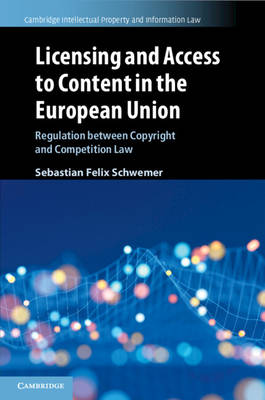
- Afhalen na 1 uur in een winkel met voorraad
- Gratis thuislevering in België vanaf € 30
- Ruim aanbod met 7 miljoen producten
- Afhalen na 1 uur in een winkel met voorraad
- Gratis thuislevering in België vanaf € 30
- Ruim aanbod met 7 miljoen producten
Zoeken
Licensing and Access to Content in the European Union
Regulation between Copyright and Competition Law
Sebastian Felix Schwemer
€ 51,95
+ 103 punten
Uitvoering
Omschrijving
Copyright is territorial, but the same cannot be said of the internet, whose borderless nature has changed the way we consume copyright-protected material. Nevertheless, territorial segmentation of online content remains a reality in the 28 member states of the European Union. Licensing and access practices do not reflect this digital reality, in which end-users demand ubiquitous access to content. For this reason, the territorial nature of copyright and traditional business models based on national exploitation prevent the completion of the Digital Single Market. Sebastian Felix Schwemer provides a unique analysis of the dynamic licensing and access arrangements for audiovisual works and music and shows how they are being addressed by sector regulation and competition law in the Digital Single Market. His analysis, which includes case law of the Court of Justice, the Commission's competition proceedings, and various legislative tools, reveals the overlapping nature of legislative and non-legislative regulatory solutions.
Specificaties
Betrokkenen
- Auteur(s):
- Uitgeverij:
Inhoud
- Aantal bladzijden:
- 305
- Taal:
- Engels
- Reeks:
- Reeksnummer:
- nr. 49
Eigenschappen
- Productcode (EAN):
- 9781108468893
- Verschijningsdatum:
- 23/06/2022
- Uitvoering:
- Paperback
- Formaat:
- Trade paperback (VS)
- Afmetingen:
- 152 mm x 229 mm
- Gewicht:
- 412 g

Alleen bij Standaard Boekhandel
+ 103 punten op je klantenkaart van Standaard Boekhandel
Beoordelingen
We publiceren alleen reviews die voldoen aan de voorwaarden voor reviews. Bekijk onze voorwaarden voor reviews.











